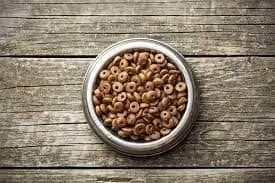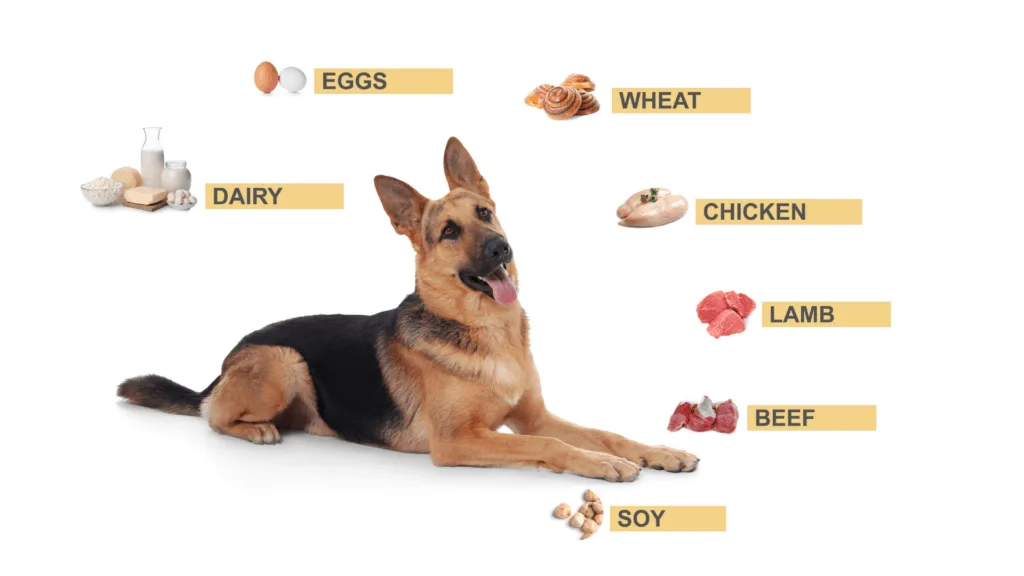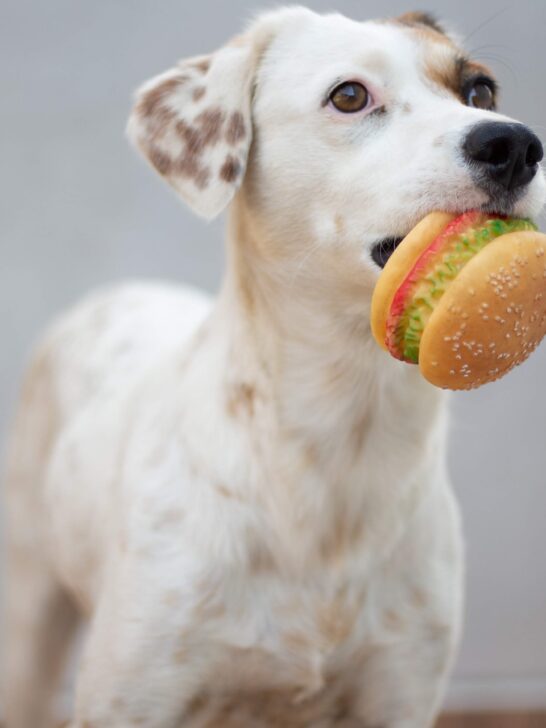Basic Nutritional Advice For German Shepherds
German Shepherds are a majestic dog breed, able to perform various tasks because of their intellect and athletic body.
However, they are also known for having a predisposition to numerous serious health problems.
It is therefore important to provide the appropriate diet and nutrients to German Shepherd dogs, from puppy to adult, to maintain their health and prevent diseases from occurring.
BASIC NUTRITIONAL REQUIREMENTS FOR GERMAN SHEPHERDS
Dogs in general require a diet with perfectly balanced nutrients to sustain their health and physiological functions.
Dogs have different nutritional requirements depending on their breed, life stage, and physical activity, but all of them require the same type of nutrients from their diet.

German Shepherds are considered herding and working dogs, and as such require a diet that can sustain their caloric needs.
An active adult German Shepherd engaged in high levels of daily physical activity will need around 1750 to 2100 caloric intake daily, while older and less active dogs can be sustained at around 1500 calories per day.
Protein is the main nutritional requirement of dogs. This is the main nutrient responsible for the growth and is essential in building and repairing muscles.
It also plays an important role in keeping the dog’s immune system healthy and highly functional.
The dog’s dietary requirement must be met daily to ensure proper growth during early life stages and for its general wellbeing.
On average, protein should account for a minimum of roughly 22% of their overall diet in order to allow for optimal growth.
As they get older, and they reach their adult weight, their protein requirement drops to a minimum of 18% to maintain proper health and bodily functions.
Fat in a dog’s diet serves as an energy source, and since German Shepherds are one of the highly active breeds, they require a high amount of metabolizable energy (healthy fats like Omega 3 fatty acid).
As a general rule, puppies tend to have higher nutritional requirements than adult German Shepherds due to their rapid growth and faster metabolism rate.
Young German Shepherd puppies need around 8% fat in their diet, while adults only require an average of 5% fat to meet daily energy requirements.
Trace minerals and vitamins are also important components of your dog’s diet.
These nutrients play important roles in various physiological functions and are equally important components for proper growth.
The specific amount and level of nutrients in a German Shepherd’s diet will vary depending on the dog’s age, life stage, genetic line, and the extent of exercise it gets daily.
WHAT TYPE OF DIETS CAN YOU GIVE YOUR GERMAN SHEPHERD DOG?
A well-balanced diet is essential in the proper growth and development of German Shepherd dogs. This is also important in maintaining and supporting their health as they get older.
This can be achieved through different diet types, from commercially available dry kibbles to home-cooked meals.
The most popular diet choice for German Shepherds is commercial dry kibbles. Most owners prefer giving their dogs dry kibble diets because of their availability and long shelf-life.
There’s also a wide range of different brands of dry kibbles dog owners can choose from.

Commercially available dry dog food usually has different formulations for different life stages of a dog’s life, with some having a specific formulation for large breeds like German Shepherds.
Make sure to choose the diet appropriate for your dog’s age, weight, and breed type to ensure proper growth, development, and overall health.
The amount of dry food will highly depend on the brand, and most will have a feeding guide on the labels.
Commercial dog food also comes in wet, canned preparations.
Though this is usually more tasty than dry kibbles, it is not economical to keep German Shepherd dogs on a strictly canned food diet due to their size and nutritional requirements.
Combining a wet canned diet and dry kibbles are usually done to enhance the taste of the food.

There are dog owners that are skeptical towards commercially available dog food and prefer putting their canine buddies on a home-cooked diet.
The advantage of giving home-cooked diets is the dog owner can control the amount of fat, protein, and other nutrients that go into the diet.
Like any other diet, home-cooked meals need to be well-formulated to meet the animal’s nutritional requirements.
It’s important to have a sound knowledge of the specific nutritional requirements of a German Shepherd dog and the specific nutritional contents of different food ingredients commonly used in making home-cooked meals for dogs.
It’s also equally important to know the food ingredients that are safe for dogs to consume and those that can cause toxicity problems.
Preparation of a home-cooked diet for dogs can also be more time-consuming and expensive compared to commercially available dog food.
It’s best to consult with a veterinarian or animal nutrition expert on how to properly prepare home-cooked diets for dogs to ensure that all nutritional requirements are properly met.
Another type of diet that has become quite popular over the past few years is the raw diet. Some dog owners claim that giving a raw diet is the ideal way to provide optimal nutrition for their canine buddies
They claim that a raw diet provides a high-quality and highly digestible protein and fat source, which is essential in maintaining the proper health of canines.
This may be true to a certain extent, but a raw diet also opens up the dog to certain health risks.
Feeding a raw diet does not fully meet a German Shepherd’s nutritional requirements.
Raw diets may contain high levels of protein and fat but lack trace minerals and vitamins which are essential for the development of a German Shepherd dog.
There are also increased chances of gastrointestinal infections due to the high risk of contamination and poor shelf life of raw meat and food ingredients.

SPECIAL CONSIDERATIONS IN FEEDING YOUR GERMAN SHEPHERD
As mentioned, dogs generally require the same balanced nutrients to maintain proper health.
However, German Shepherds are known to be predisposed to several health problems and congenital issues, and it’s important to keep these predispositions in mind when thinking about your dog’s nutrition.
German Shepherds are highly predisposed to developing hip dysplasia and joint problems, and the nutrition they get as a growing puppy must be formulated towards preventing and/or managing this condition.
It has been discussed that appropriate protein, calorie content, and trace minerals are essential in ensuring the proper growth of German Shepherd puppies.
Deficiency in one or some of these nutrients can lead to compromised development and increased risks of hip dysplasia in these dogs.
However, it’s also important to note that excessive amounts of nutrients, particularly trace minerals like calcium and phosphorus, can be detrimental too.
Large breeds like German Shepherds have long bones that take some time to fully develop.
Their growth plates calcify much slower compared to smaller breeds, in order to allow enough time for these bones to fully develop.
Excessive supplementation or intake of minerals like calcium and phosphorus can cause these growth plates to calcify earlier than usual, and lead to growth problems in German Shepherd dogs.
Supplements like glucosamine and chondroitin sulfate can help manage signs of joint problems and dysplasia in German Shepherds, and incorporating them into the dog’s diet is highly recommended.
There are commercially available dog food diets formulated specifically for German Shepherds that are fortified with joint supplements and nutrients to help prevent or manage these conditions.
FAQ:
1. What type of diet is best for German Shepherd dogs?
Answer: A well-balanced diet that is appropriate for their age, weight, and breed type is best for German Shepherd dogs. This can be achieved through different diet types, from commercially available dry kibbles to home-cooked meals.
2. What are the nutritional requirements for German Shepherd dogs?
Answer: German Shepherds require a diet with perfectly balanced nutrients to sustain their health and physiological functions. Protein is the main nutritional requirement of dogs, while fat serves as an energy source. Trace minerals and vitamins are also important components of their diet.
3. What is the appropriate caloric intake for German Shepherd dogs?
Answer: An active adult German Shepherd engaged in high levels of daily physical activity will need around 1750 to 2100 caloric intake daily, while older and less active dogs can be sustained at around 1500 calories per day.
4. Is it safe to feed my German Shepherd a raw diet?
Answer: Feeding a raw diet does not fully meet a German Shepherd’s nutritional requirements and can open the dog to certain health risks such as gastrointestinal infections due to the high risk of contamination and poor shelf life of raw meat and food ingredients.
5. What should I consider when feeding my German Shepherd?
Answer: German Shepherds are known to be predisposed to several health problems and congenital issues, and it’s important to keep these predispositions in mind when thinking about your dog’s nutrition. Excessive amounts of nutrients, particularly trace minerals like calcium and phosphorus, can be detrimental too. Supplements like glucosamine and chondroitin sulfate can help manage signs of joint problems and dysplasia in German Shepherds.




















